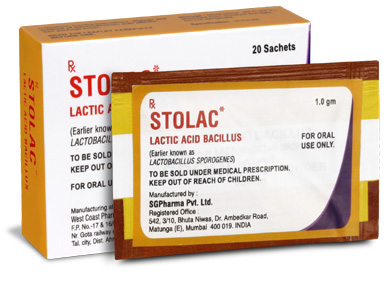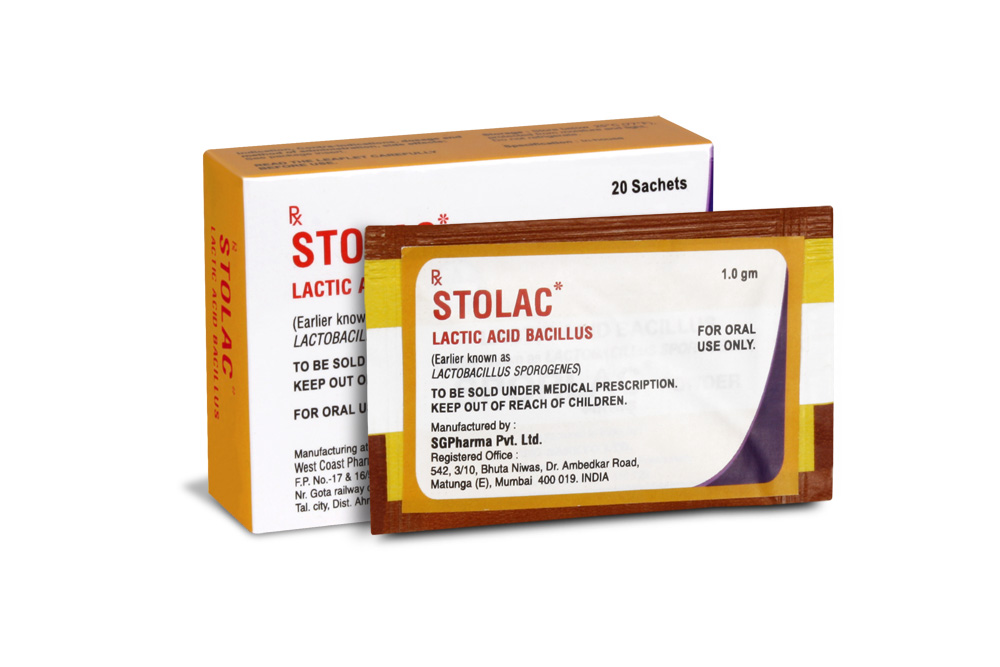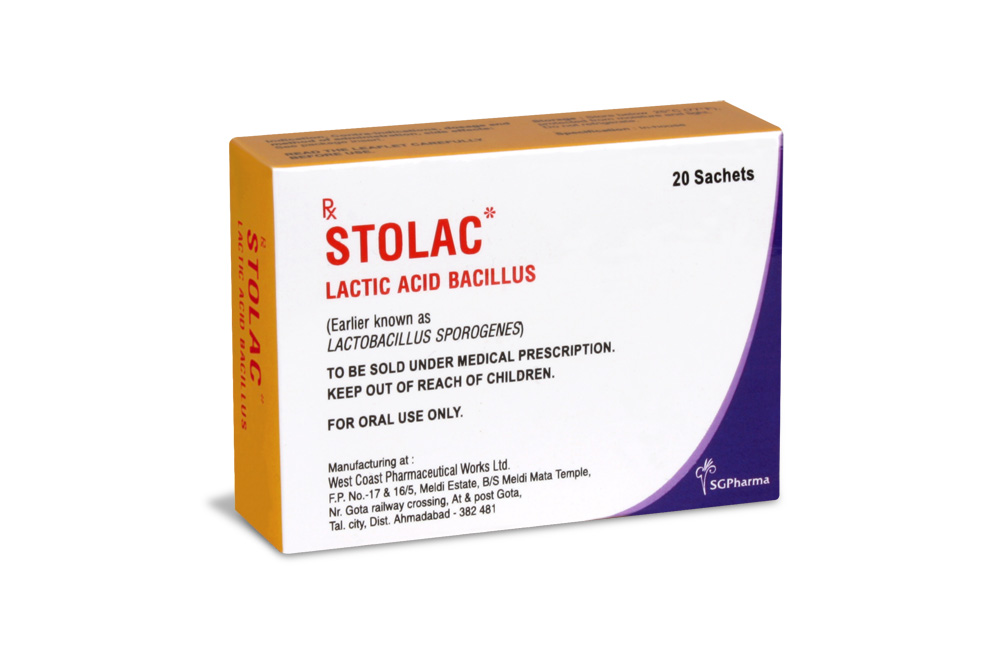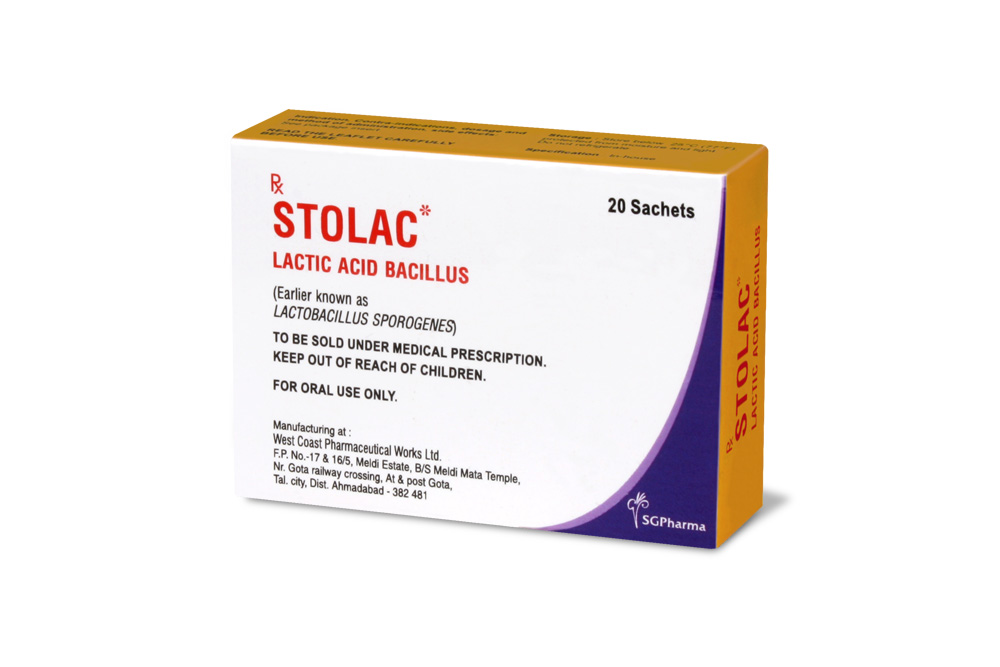
10 Sachets
20 Sachets
STOLAC (Lactic Acid Bacillus) is a gram-positive, sporeforming, lactic-acid producing bacillus. It is non-pathogenic probiotic bacteria. It plays a predominant role in intestinal digestion by synthesizing Vitamin B3, B5, B6, B12, folic acid, biotin, Vitamin K, bacteriocins and digestive enzymes such as amylase, protease and lipase.
STOLAC is white to greyish white powder with characteristic odour.
COMPOSITION :
Each sachet of 1.0 g Powder contains :
Not less than 150 million spores of Lactic Acid Bacillus
(Earlier known as Lactobacillus Sporogenes)
PHARMACOLOGY AND PHARMACOKINETICS :
The mechanism of the action of Lactic acid bacillus is presumed to be results of improving gastrointestinal ecology by replenishing the quantity of desirable obligate microorganisms and antagonizing pathogenic microbes. This produces shift in the environment in the support of complex gastrointestinal flora. Two isomeric forms of lactic acid can be produced by lactic acid-producing bacteria—dextrorotatory (D (-)) lactic acid and levorotatory (L (+)) lactic acid. L (+) lactic acid is completely metabolized in the body; however, D (-) lactic
acid is not completely metabolized, resulting in a degree of metabolic acidosis. L. sporogenes produces only L (+) lactic acid.
L. sporogenes is assumed to produce bacteriocins and short chain fatty acids. As the organism grows, it assimilates and incorporates cholesterol into its cellular structure. L. sporogenes possesses significant [beta]-galactosidase (lactase) activity in vitro. Lactic acid bacillus (earlier known as Lactobacillus sporogenes) when administered orally, are activated in stomach due to low pH of acidic gastric juice, moisture and mechanical churning action of stomach. The spore coats swell and enlarge in size. Their water content increases and the rate of metabolic process rises. Later, in duodenum facilitated with alkaline pH and bile such activated spores germinate and transform again into vegetable cells. They start growth and proliferation in the small intestine in every 30 minutes thereafter. Usually, germination process takes place in four hours after ingestion.
While proliferating in intestine, they provide viable lactobacilli which are capable of setting down in the intestinal tract and produce lactic acid and bacteriocins. The production of lactic acid during fermentation lowers pH of the intestinal content and thus prevents the growth of pathogenic gram negative micro-organisms. A low pH (4 to 5) favours lactobacilli and a high pH (6 to 7) is optimum for E.coil and other enteric pathogens. In addition, volatile acids produced have some anti-microbial activity under conditions of low oxidation reduction potential. Thus, Lactic acid bacillus (earlier known as Lactobacillus sporogenes) are capable of protecting from pathogenic invasion into intestinal tract and help to restore the normal balance of the intestinal flora after antimicrobial drug treatment where as the non spore forming (vegetable cells) Lactobacillus acidophilus, Lactobacillus bifidus, Lactobacillus casei and Streptococcus faecalis fail to fulfill above conditions. In addition, Lactic acid bacillus being ‘semi-resident’ are slowly excreted out of the body (7 days after discontinuation of administration). Thus they possess ideal and desired characteristics of a drug without causing any pathological or pharmaceutical side-effects.
INDICATIONS :
These include :
• Digestive disorders
• Aphthous stomatitis
• Gastrointestinal infection induced by pathogenic bacteria
• Diarrhoea (neonatal, infant, adults)
• Antibiotic induced diarrhoea• Irritable bowel syndrome
• Lipid Disorders
• Constipation Lactose tolerance Candidiasis
• Dyspepsia
Administration :
For oral use.
Dosage :
For infants 50 million spores 3 times a day. For children, 50- 100 million spores 3 times a day. For adults, 100-200 million spores 3 times a day. Take the powder preferably before meals. The dosage should be modified according to age and condition. 5 to 7 day’s treatment in usual cases.
CONTRAINDICATIONS :
Overgrowth of commensal lactobacilli can be a feature of patients with short bowel syndrome and is frequently associated with D-lactic acidosis.
SIDE EFFECTS :
Acute toxicity studies in animals have been conducted with doses as high as 50 g/kg for seven days. No abnormalities, either during supplementation or in the period after withdrawal of the supplement, were observed. In humans, adverse reactions following supplementation have not been reported.
INFORMATION FOR PATIENTS :
If you have allergies to milk or you are sensitive to lactose, do not use this supplement.
STORAGE :
Store below 25°C (77°F), protected from moisture and light.
Do not refrigerate.
SHELF LIFE :
36 months from the date of manufacture.
PRESENTATION :
STOLAC is supplied as sachet of 1.0 gm powder which contains not less than 150 million spores of Lactic Acid Bacillus.
20 sachets per box.

 Cardiovascular
Cardiovascular








